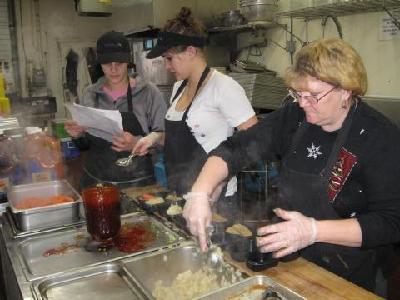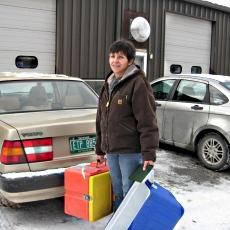
Many elderly and disabled Americans are isolated by frailty, illness and at this time of year, in the northern states' weather, many also suffer from malnutrition. A non-profit program called Meals on Wheels provides and delivers more than one million meals a day to clients across the United States. The people who make and deliver those meals in Vermont say it's a vital service that gives both ways.
Bustling kitchen
The commercial kitchen at Fitz Vogt Catering which is operating the Meanls on Wheels program in Rutland, Vermont, is a blur of midmorning activity. A chef is baking strips of chicken breast, 2,000 of them, while another employee is using a paddle to stir an oversized pot of stuffing.
"Everything is made from scratch here. They cut up the chicken and bread it by hand," says Penny Jones, the administrative coordinator at Meals on Wheels, adding that the kitchen typically prepares about 1,000 meals a day. "They start here at 5:30 in the morning and all the meals are out the door by 11:00 a.m."
The meals are delivered to people all across central Vermont - covering a 160-kilometer radius.
"It's really important, because if you can imagine when you're hungry for lunch and waiting for the person to bring your food," says Jones. "And in the winter, not knowing if they'll be able to get to you or not."

Meals to go
It takes a large group of paid and volunteer drivers to make sure the food does get through. People like Maryterese Briggs. She's a dietary aide for Meals on Wheels and three days a week, she loads up her 20-year-old Volvo and hits the road.
"I like it, I like the people," she says. "Just to see the smile sometimes on the client's faces when you walk in. Sometimes you're the only person they see all day. It just makes you feel good."
Briggs pulls up to a tired looking house to make her first delivery. A water pipe hisses loudly just inside the front door. The door is unlocked. Briggs opens it and bounds up a small flight of stairs to the kitchen where an older gentleman sits waiting. He smiles and gets up slowly to greet her. They exchange a few words and then she's off again to her next stop.
"Did you ever cry over this job?"
"Yes, yes. There's one stop we're going on today and it's just the wife. The husband passed away last Friday. I think it makes you more aware of your own mortality, you know, some day this is going to be me, someday this is going to be you." says Briggs.
Not just lunch
Briggs turns a corner to head to Leona Kish's house. Kish lost her husband about a year ago. Kish is a tiny woman, dressed in a bright red sweater. Meals on Wheels provides her with lunch three days a week.
"I love cooking, but now that I'm alone, I don't cook as much," says Kish. "And with my daughter - she wanted me to get Meals on Wheels to make sure I get all the vitamins and benefits I need. But really I enjoy mostly the people coming. I love people and I love to sit down and visit with them. But many of my friends have gone. My little pet here, Rudy, he's such a good companion for me."
She offers Briggs homemade rum balls and confides that they're made with an old family recipe and were favorites of her late husband. Then she grows quiet for a moment.
"This used to be my husband's chair and now I occupy this so I can look out the window a little bit and see something," she says. "Listen, I wish all of you a happy new year with the best of health to everybody."
Briggs walks back to her car smiling and brushing off a few stray cookie crumbs. Few jobs, she says, can make you feel so appreciated - and so thankful.
日本機(jī)器人能說(shuō)會(huì)畫 為老年人分憂
New Yorkers help neighbors at Thanksgiving
(來(lái)源:VOA 編輯:崔旭燕)
